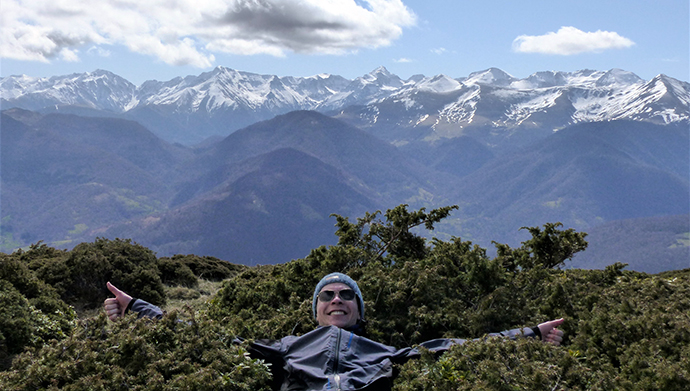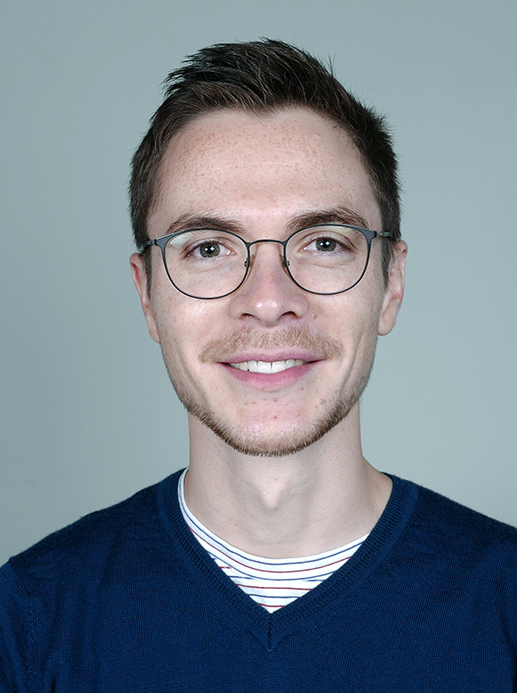- What is your educational background?
- In 2018, I graduated from the ISAE-ENSMA engineering school (in Poitiers, France) where I specialized in mechanics and aeronautics (equivalent to a Master's degree). Following a rich three-month experience at the Swedish Institute of Space Physics – IRF (in Kiruna), I decided to pursue a career in astrophysics by doing first my six-month Master’s placement and then my Ph.D. at the Research Institute in Astrophysics and Planetology – IRAP (Toulouse, France). I successfully defended my thesis in July 2022 and obtained the Ph.D. degree issued by the University of Toulouse.
- Where have you worked before and in what field?
- My previous work as a Ph.D. student at IRAP was highly multi-faceted and combined multiple scientific disciplines. It was important to me to study the Sun as a whole, at both global and small scales, and using theoretical, modeling and observational approaches all together. The studies I carried out spanned from pure theory to mature operational tools and covered many topics such as:
- the internal structure and propagation of CMEs
- the properties and origins of the nascent slow solar wind (see e.g. Figure 1.)
- a systematic optimization of global coronal models
- the modeling of coronal loops and their composition (i.e. the FIP effect)

At RoCS I will continue to work on coronal loops but with a high focus on observations. I will specifically look at how the energy is transported and deposited in the solar corona by looking at damping signatures of waves/oscillations. The exploitation of high-resolution observations from Solar Orbiter and DKIST coupled with state-of-the-art processing techniques will be crucial to better constrain current models, as the one I developed during my Ph.D.
- What are you going to study?
- A fundamental question in solar physics remains to explain the energy transport and dissipation throughout the different layers of the solar atmosphere. That still is poorly constrained by current observations, and yet is a critical aspect in many studies. I will look at the damping of either propagating or standing waves in coronal loops, and how that may affect the mass and energy transport along the loops.
- How do you plan to solve/answer to the main question?
My postdoctoral project actually belongs to the ORCS project led by Petra Kohutova, where my contribution will be mostly oriented to the observational/theoretical aspects.
I will exploit the most recent high-resolution observations to date from Solar Orbiter, SDO and DKIST. I will revisit and develop techniques to extract wave/oscillation properties from these observations, with a high focus on accuracy to benefit the most from the unprecedented high quality of these observations.

- What brought you to RoCS?
- I have always dreamed of traveling to Norway, and it turned out that joining RoCS/ITA was a really sweet spot for my career perspectives. The well-known expertise of the group in spectroscopy and in radiative based modeling of the low solar atmosphere was particularly appealing to me.
- How can you describe your experience here at ITA and in Oslo so far?
- Beyond my expectations! I highly appreciate the warm welcome I have received at ITA. I like the group dynamics very much. As of now living in Oslo is great, but let's see how the winter season goes.
- What do you expect from this experience at ITA?
- A thriving experience from both a personal and professional perspective that pushes me beyond my limits. I want to tackle new challenges to develop my career skills, and be useful to the group by sharing my own expertise.
- What do you like to do in your spare time?
- My curiosity has led me into having many hobbies that I try to reconcile as much as I can with my research work duties, e.g.: hiking, running, badminton, bonsai care, playing music (kalimba), astronomy, photography, reading and playing video games.
